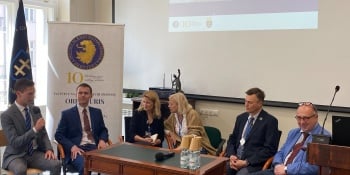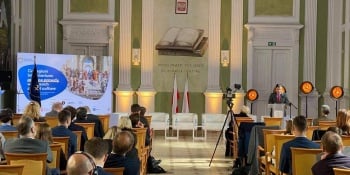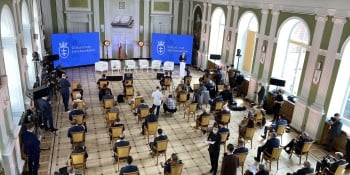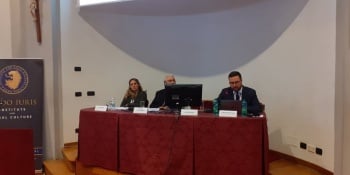
Many Internet users face the problem of censorship in social media. This was the focus of the debate organised by the Ordo Iuris Institute as part of the Warsaw conference of the Organisation of Security and Cooperation in Europe. Lawyers and journalists from Poland and abroad took part in the event.
During the meeting, insights into censorship on the Internet were provided by Jolanta Hajdasz, PhD (Association of Polish Journalists), Paweł Lisicki ("Do Rzeczy”, wSensie.tv), Cezary Krysztopa ("Tygodnik Solidarność"), Krzysztof Łuksza (wRealu24.pl), Łukasz Karpiel (PCh24.pl), and Varro Vooglaid, an Estonian lawyer and columnist. It was noted that modern censorship in social media is ever more frequently assuming an economic dimension. Apart from merely blocking or removing content, the administrators of social platforms go as far as to restrict monetisation, i.e. they prevent the possibility of earning money on content that arguably "does not meet the standards".
The speakers also emphasised that almost solely conservative content is censored. While censoring content, platform administrators often use the imprecise term of "hate speech." In many cases, Internet users do not receive any feedback about the reasons for removing the materials they posted.
The debate was opened by attorney Jerzy Kwaśniewski.
"Freedom of speech and freedom of assembly are one of the fundamental freedoms of democratic societies. They guarantee a proper process legitimising the system, legitimising public authority and its exercise," underlined the President of Ordo Iuris.
The mechanism of censorship employed by the owners of Facebook and YouTube was described by Tymoteusz Zych, PhD, Vice-President of the Ordo Iuris Institute. He also made a case for introducing appropriate changes into legal regulations in order to guarantee the freedom of speech in social media.
"Access to information is determined by social media. This sphere undoubtedly needs legal regulations," noted Zych.
Attorney Tomasz Piotr Chudzinski, in turn, discussed current legal tools that may be used in response to the unlawful removal of content posted in social media.
"In Poland, the right to freely express one's views is considered a personal right. If social media use censorship, the personal right of the user who posted specific content is violated," he stated.
The debate was part of the Human Dimension Implementation Meeting - an annual conference on human rights and democracy, the largest in its kind in Europe. The representatives of Ordo Iuris participate in the conference every year

A scientific conference "The Phenomenon of Euthanasia. Interdisciplinary Reflections", co-organized by the Ordo Iuris Institute. During the event, the topic was analyzed from the perspective of medicine, law, sociology, philosophy or theology. Speakers presented, among other things, the legal status related to euthanasia in Poland and other European countries. They pointed out the problems raised by the spread of this procedure. Participants also drew attention to the most important measures to counteract the restriction of the right to life.

Collegium Intermarium has started its academic year. The inauguration ceremony took the form of an international conference attended by scholars, politicians and commentators from the US, France, Hungary, Croatia and Poland, among other countries. The guests included French politician Marion Maréchal, New York Post columnist Sohrab Ahmari, Prof. Adrian Vermuele from Harvard University, and former Speaker of the Sejm Dr Józef Zych. The conference is titled “Collegium Intermarium: a space for truth in the era of cancel culture”.

Representatives of state authorities, outstanding academics and journalists from Poland and abroad take part in the conference inaugurating the establishment of Collegium Intermarium. The goal of the new university is to create a platform of co-operation between academics from the Intermarium region. Its flagship field of specialisation is law, but it also offers a rich programme of postgraduate study courses.

An impediment to the realization of real women's rights is the frequent presentation of the concept in ideological ways. One of the most promoted directions in contemporary discourse to realize women's rights is the gender perspective. However, as it turns out, this concept raises a number of doubts, which stem from its strongly ideological nature and lack of effectiveness in real improvement of the situation of women in the world. The second in the series of conferences "In Defense of Women's Rights" was devoted to these issues.

There is currently a wide-ranging discussion on the concept of women's rights. The Ordo Iuris Institute organized the first in a series of debates on this issue. Two panels were devoted to presenting the political and doctrinal context of the issue of women's rights and women's right to health. The main premise of the conference was to address the issue of women's rights in an ideology-free manner.

The values which form the basis for law have a profound impact on modern Europe. This was the topic of the House on the Rock “Axiology of Law for the Europe of Tomorrow” Conference, which saw many prominent researchers engage in discussion in Rome. The event was organised by the Ordo Iuris Institute and the Pontifical University of St. Thomas Aquinas.